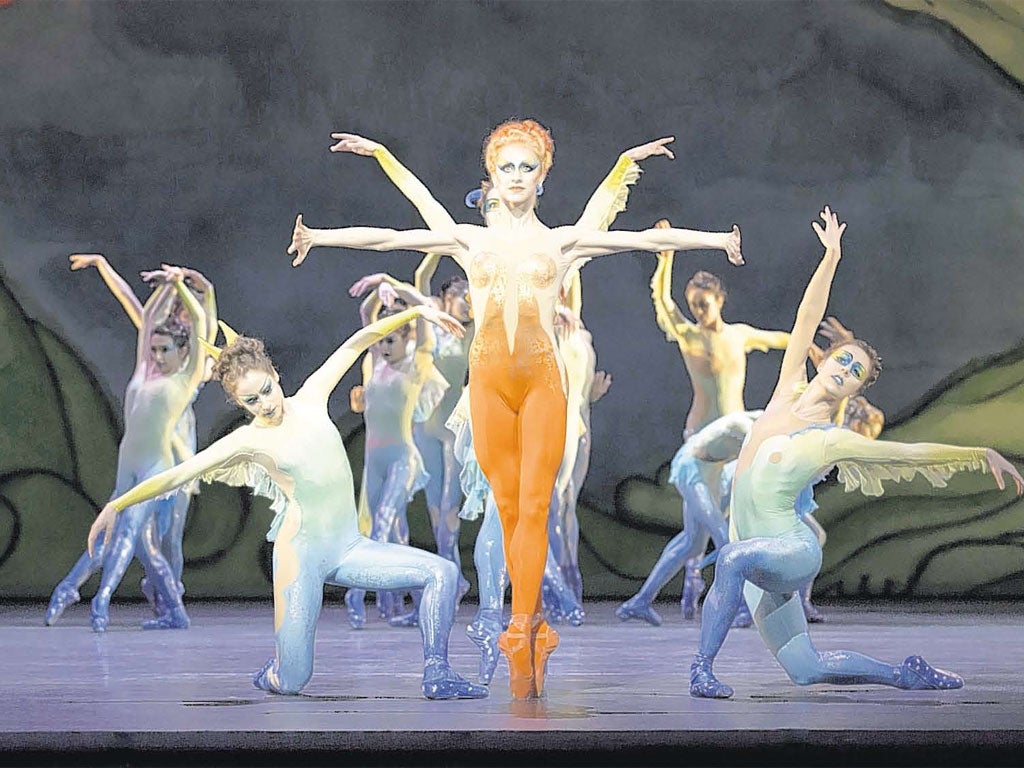Metamorphosis: Titian 2012, Royal Opera House, London / Play Without Words, Sadler's Wells, London
The Royal Ballet director signs off with the most exciting new triple bill in memory, inspired by great works of art

Your support helps us to tell the story
From reproductive rights to climate change to Big Tech, The Independent is on the ground when the story is developing. Whether it's investigating the financials of Elon Musk's pro-Trump PAC or producing our latest documentary, 'The A Word', which shines a light on the American women fighting for reproductive rights, we know how important it is to parse out the facts from the messaging.
At such a critical moment in US history, we need reporters on the ground. Your donation allows us to keep sending journalists to speak to both sides of the story.
The Independent is trusted by Americans across the entire political spectrum. And unlike many other quality news outlets, we choose not to lock Americans out of our reporting and analysis with paywalls. We believe quality journalism should be available to everyone, paid for by those who can afford it.
Your support makes all the difference.Cooks you can have too many of, ditto choreographers, so it was surely asking for trouble to cram seven of them into the making of three ballets. One can only think that Dame Monica Mason, in her final impresarial fling before retiring from the Royal Ballet, couldn't bear to leave anyone out. This was a project whose logistics would have tied even Diaghilev in knots: seven choreographers, three visual artists, three composers ... But against all odds, Metamorphosis: Titian 2012 – a bold response to a trio of paintings in the National Gallery – is a magnificent vindication of Mason's low-key leadership style. It's quite simply the most exciting new triple bill in memory. What a way to go.
Titian's paintings focus on Ovid's story of Diana and Actaeon. He, out hunting with his hounds, spies on the goddess bathing in a woodland glade. She, enraged by his presumption, turns him into a stag which his dogs promptly tear to pieces. Three contemporary artworks on this theme are on display in the National Gallery and these, in turn, have morphed into settings for the ballets.
In Machina, the curtain rises on shrouded grey-black mystery. The music is Nico Muhly's, a plangent Renaissance pastiche. Through gauze, you can just make out two silhouetted figures, and, little by little, something hard-edged. This turns out to be artist Conrad Shawcross's robot, mounted on a steel tripod, its articulated, horsey neck topped by a long proboscis like a magic wand. Gaps in the music betray its wheezing whir as the robot stealthily draws shapes in the air, suggesting the busy hand of Titian as well as Diana's disrobing, though in the foreground Tamara Rojo and Leanne Benjamin also obliquely share that role.
The choreographers Wayne McGregor and Kim Brandstrup are chalk and cheese, but in tandem each one's defining qualities soften and merge. Carlos Acosta is rather wasted on his floorbound steps, but Edward Watson is extraordinary in his bonelessness. The robot's moves, meanwhile, are put through the same choreographic process. It's transfixing.
The middle piece, Trespass, ups the tempo with a tom-tom driven score by Mark-Anthony Turnage. The centrepiece of Mark Wallinger's set is a gleaming glass curve like a snazzy lift shaft which serves beautifully as the pool in which Diana and her nymphs disport themselves. Christopher Wheeldon's input registers loud and clear in a series of heart-stopping pas de deux, Melissa Hamilton leading a succession of three Dianas oozing sexy hauteur.
Diana and Actaeon, which uses three choreographers and big-bodied music by Jonathan Dove (almost Wagnerian with its crowding brass and rippling harp) is the only narrative treatment, setting the mythic encounter in a Pop Art forest (Chris Ofili), with a comically loping corps of piebald hounds. Wistfully, the story toys with other, happier, outcomes. At one point it looks as if Marianela Nunez's athletic, orange-wigged feminist might succumb. In the end, though, as we know he must, Federico Bonelli's would-be lover meets his fate as Pedigree Chum.
Cautiously perhaps, Metamorphosis was slated for only four nights, but it's sure to be back for many more. Grab it when it comes.
Fans of Matthew Bourne have waited 10 years for a revival of Play Without Words, his tense, stylish, somewhat sinister take on the gender and class-bound mores of the 1960s, loosely based on Joseph Losey's film The Servant. In Bourne's story, moneyed Anthony buys a Chelsea pad and hires a butler and a maid to pour his Scotch and iron his Y-fronts, until the rumblings of the sexual revolution conspire to turn the tables.
Bourne's dastardly clever twist is to double- or triple-cast some scenes, so we might see up to three Anthonys interacting with three versions of his posh-totty fiancée. Sometimes they move in synch – drumming fingers on a table, straightening a tie. At other times one couple might represent another's wishful thinking, one Anthony getting a goodnight peck, while another gets a full-on snog. As with all Bourne's best work, the detail and the humour is delicious. A game of charades, crisply timed to Terry Davies's fabulous jazz score, is alone worth the price of the ticket.
'Play Without Words': to 5 Aug (0844 412 4300)
Join our commenting forum
Join thought-provoking conversations, follow other Independent readers and see their replies
Comments